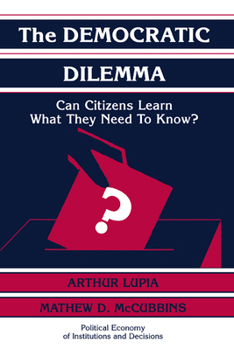The Democratic Dilemma: Can Citizens Learn What They Need to Know?
Select Format
Select Condition 
Book Overview
Most citizens seem underinformed about politics. Many experts claim that only well-informed citizens can make good political decisions. Is this claim correct? In The Democratic Dilemma, Professors... This description may be from another edition of this product.
Format:Paperback
Language:English
ISBN:0521585937
ISBN13:9780521585934
Release Date:March 1998
Publisher:Cambridge University Press
Length:300 Pages
Weight:1.30 lbs.
Dimensions:0.8" x 6.2" x 9.2"
Customer Reviews
1 rating
Interesting View of Voter "Ignorance"
Published by Thriftbooks.com User , 20 years ago
Arthur Lupia and Mathew McCubbins' The Democratic Dilemma: Can Citizens Learn What They Need to Know? offers an alternative view to the idea that voter ignorance hinders rational political decision making. Instead, Lupia and McCubbins argue that access to limited information by certain political players and under certain conditions allows voters the methods to make rational decisions. First, a note about the researchers reference to Aristotelian ethos. In the theoretical foundation of the text, Lupia and McCubbins correctly interpret Aristotle's writings in On Rhetoric as asserting the power of ethos (perceived speaker credibility) on persuasive success. However, the researchers suggest: "[I]t may be impossible for us to know much about another person's character. Aristotle concludes that persuasion requires such knowledge. We disagree...By contrast to Aristotle, we base our explanation of persuasion on the premise that people need not know one another well" (p. 42). I believe that this assessment and interpretation of Aristotle's writings on persuasion is flawed. Aristotle was not arguing that we must know speakers well before we will listen to them; in contrast, Aristotle believed that a speaker also creates credibility during a speech, (e.g., derived credibility) and the perception of the speaker's credibility in progress affects our likelihood of being influenced in addition to the speaker's initial credibility. I wouldn't argue that their interpretation negates their underlining theroetical foundation, but instead, that what Lupia and McCubbins argue in their theory is actually consistent with this classic view of credibility and influence. In my view, their take is not a "different" take, but instead, is a more nuanced take. Nevertheless, this is a relatively minor point of contention. This text contains a very carefully laid out theory of voter knowledge and influence under very specific conditions, adding important nuance to our understanding of political influence and decision-making. The latter part of the book provides solid empirical research to support their theory. A solid read for the political scholar. The researchers make a novel argument, one that raises immediate questioning by most readers, but then lays out their case in a refreshingly convincing manner.





